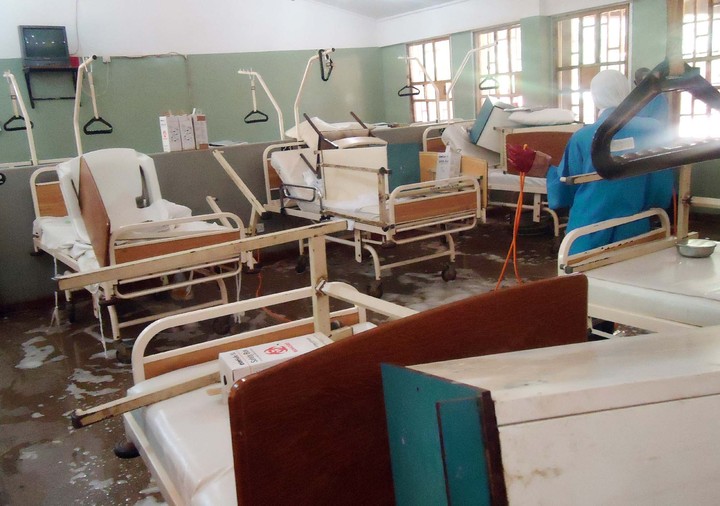Following
the expiration of the 15-day ultimatum issued by the Joint Health Sector Unions
(JOHESU) for the federal government to address the various injustices in the
Nigerian health sector, all cadres of health professionals except physicians
today (Wednesday) began a 3-day warning strike to press home demand.
In an
exclusive interview with HealthNewsNG.com, Adeyeye Adetunji Tam, Chairman of
the JOHESU at Ladoke Akintola University Teaching Hospital, Osogbo, Osun state
said the Nigerian government is insincere and has failed to keep the promises
it made with the health workers.
Tam said the
government failed to deliver its promise "to promote members from 14 to 15
being director position, failure to issue a circular on entry point for interns
medical laboratory scientists and post-NYSC medical laboratory scientists; it
also failed to comply with the judgment of the National Industrial Court (NIC)
on consultancy and specialist allowance of deserved members.
Others are:
"Failure to issue a letter of withdrawal for the illegal post of deputy
chairman of the medical advisory committee (DCMAC). Even when they eventually issued
the letter of withdrawal, it was retrieved within 48 hours," he said.
"Failure
to adhere to the skipping of CONHESS 10 as addressed and directed by the NIC
judges.They have also failed to adjust retirement age from 60 to 65
years."
The strike
which would be on till Friday could become indefinite if the government fails
to address the issues raised by the health workers.
"The
modality is to go on 3 days warning strike to press home our demands and to let
them know we are not joking about it. It will end on Friday. But if
nothing happens afterwards, we will have no choice than to proceed on
indefinite strike," Tam said.
Members of
the union include nurses and midwives, pharmacists, medical laboratory
scientists and several others.
Situation reports
gathered by HealthNewsNG.com from major health facilities across the nation
revealed that the level of compliance is high.
In Osun
state, members of the union working at the federal government-owned Obafemi
Awolowo University Teaching Hospital Complex (OAUTHC) are complying with the
strike directive. At the state-owned general hospital and Ladoke Akintola
University Teaching Hospital in Osogbo, the workers fully complied with the
directive on the first day of the strike action.
At the
premier teaching hospital in Nigeria, the University College Hospital (UCH)
Ibadan, the Chief Medical Director (CMD) Prof. Temitope Alonge attempted to
keep the hospital's Public-Private Partnership (PPP) laboratory open, an action
that was strongly resisted by members of JOHESU in the hospital.
At the Federal Medical Center (FMC) Abeokuta, Lagos
University Teaching Hospital (LUTH) and Ekiti State Teaching Hospital, all
healthcare workers except physicians were on strike on the first day of the
3-day warning strike.
The situation was however different at the
Federal Medical Center in Umuahia, Abia state as doctors took over the blood
bank.
Speaking on the success of the first day of the
strike, Tam said it has to do with the realisation of the injustice in the
healthcare sector that is affecting 90% of the sector's workforce.
"We are ready to fight to the very end,
even if it means shedding our last blood. That is just the beginning," he told HealthNewsNG.com.
On the impact the strike of the strike on healthcare and medical education in Nigeria, a medical expert who spoke to HealthNewsNG.com on condition of anonymity said it would affect patient admission, drug administration, diagnoses, and other essential aspects of patient care.
"There will be no admissions and no investigations. Nurses are the ones that feed and administer drugs. There will be no investigations and patients may have to go to private facilities for diagnostic tests.
"It would affect several divisions including surgery, pediatrics, obstetrics and gynecology. Hospitals will not be able to admit patients with cases that are classified as high risk," the expert told HealthNewsNG.com.
Follow @HealthNews_ng for exclusive health reports, features, incisive analyses and useful health tips. Visit http://t.co/Mof91blWX4 today
— HealthNewsNg (@HealthNews_ng) January 22, 2014




























obat pembesar penis
ReplyDeleteobat peninggi badan
obat pembesar payudara
jual vimax asli original canada murah
jual vimax asli original canada murah
jual vimax asli original canada murah
jual vimax asli original canada murah
jual vimax asli original canada murah
jual vimax asli original canada murah
vigrx
vigrx plus
vigrx asli
vigrx original
vigrx indonesia
situs social bookmark pagerank tinggi gratis
situs portal info indonesia
Alat Pembesar Payudara
Alat Pembesar Penis
Alat Sex Untuk Pria
Alat Sex Untuk Wanita
Kesehatan
Krim Pembesar Payudara
Krim Pemutih Wajah
Minyak Oil Pembesar Penis
Obat Kuat Sex Pria
Obat Pembesar Payudara
Obat Pembesar Penis
Obat Penggemuk Badan
Obat Peninggi Badan
Obat Penyubur Sperma
Pelangsing Herbal Alami
Pemutih Badan
Produk Kecantikan
Ring Dan Kondom Silikon
Selaput Dara Palsu
Perapat Vagina
agen vimax asli
distributor vimax asli
vimax asli